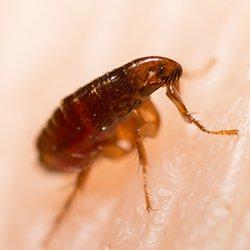Going on a brisk hike down a camping trail and giving some love to a sweet little stray may both seem harmless enough, but you might find yourself taking home more than you bargained for. Parasitic pests like fleas and ticks can be found all over the place in nature, and the last place you ever want to find them is on your Hartford property. If itchy red welts aren't bad enough, they're also known to transmit some pretty nasty pathogens, and that's never something you want to risk having around your home.
Facts About Ticks
There are three different family branches of ticks; hard tick, soft tick, and monotypic. The good news is, there's only one type you'll need to keep your eyes peeled for, and that's the hard tick. Unfortunately, that's just about the only good news you'll get when it comes to ticks. These insects are small, flat, reddish-brown to dark brown arachnids with eight legs and rounded or oval-shaped bodies. Depending on the species and maturity, they could be as small as a millimeter or as long as ¼ of an inch.
Ticks have small mouthparts at the front of their bodies, often referred to as the head. They use these mouthparts to burrow into the epidermis and engorge themselves with blood, which admittedly is a fairly long process. It takes a tick roughly 5-7 days to fully engorge. If one is caught before latching on, or within the first 24-36 hours of attaching, the risk of catching a tick-borne disease is significantly minimal. If they do get a chance to feast for an extended period of time, though, you could catch a myriad of pathogens:
- Anaplasmosis
- Babesiosis
- Lyme Disease
- Ehrlichiosis
- Rocky Mountain Spotted Fever
- Tularemia
Facts About Fleas
Fleas are a fairly common pest among pet owners, though they can and will infest a home and property without the presence of a furry companion. These insects are roughly 1/8 of an inch long, dark brown to black in color, with flat oval-shaped bodies covered in microscopic hairs. They have six long legs that allow them to jump several inches to both escape predators and move to new hosts, and if one jumps onto you, you run the risk of catching some pretty nasty pathogens from these parasitic pests as well:
- Typhus
- Plague
- Cat Scratch Disease
- Tapeworms
Why Do I Have Fleas And Ticks On My Hartford Property?
Parasitic pests like fleas and ticks infest areas where there is a bounty of food to be found. Ticks rarely infest the interior of a home, but they're often found in yards that see high foot traffic of wildlife, including raccoons, deer, birds, and various rodents. Fleas infest in a similar manner, except they come with the added bonus of infesting the inside of homes as well. So how can you reduce your chances of infestations?
- Apply flea and tick preventative treatments to your pets, and any new pets you bring into your home
- Keep tight-fitting lids on outdoor trash cans
- Maintain a regular mowing schedule
- Trim back trees and bushes
- Fill in any ground holes that could house rodents
- Clean outdoor eating areas immediately after eating
- Thoroughly inspect yourself for ticks after spending time in the wilderness
How Can I Get Rid Of Flea And Tick Infestations Already On My Hartford Property?
These insects are incredibly resilient, and they can create a huge hassle if you try to eradicate them on your own. Given the dangers fleas and ticks pose to you and your household, your best bet is to hire professional help, and you couldn't ask for better help than American Pest Solutions.
Our company was founded over 100 years ago, and it's been owned by the same family for four generations. Our highly-trained pest experts pass extremely rigid background checks before we hire them, and we always use the latest and safest pesticides and procedures in all of our treatments. Get in contact with us today to start discussing your pest control options.

